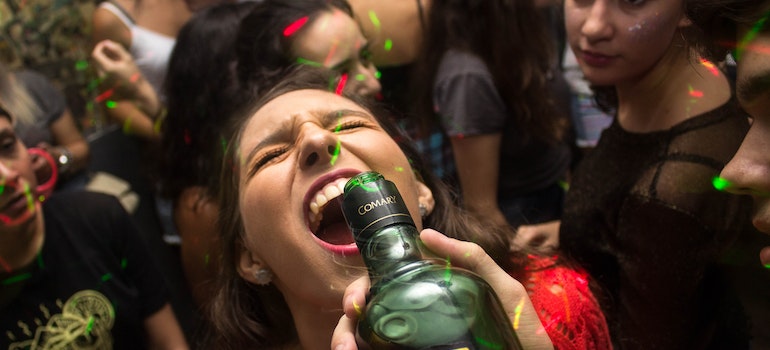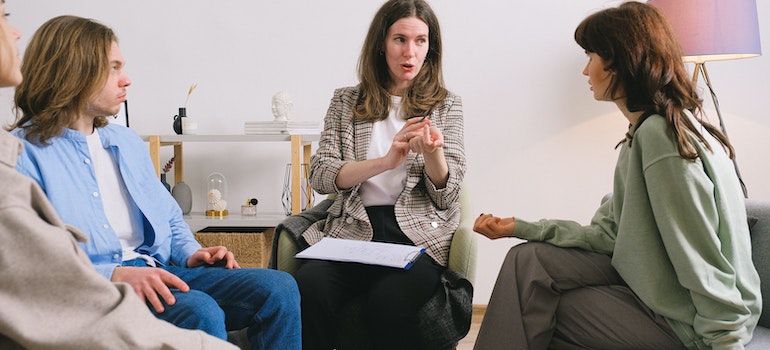Addiction is famously difficult to leave behind. Most people who abuse substances make multiple attempts to quit before they are successful and even among those who seek professional treatment, 40-60% will relapse – most within a year of achieving sobriety. But those relapses don’t come out of nowhere. They are triggered by changes in your living situation and mental health. Recognizing and managing triggers like that can, therefore, help you avoid relapse and increase your chances of a successful long-term recovery. This is why treatment at Harmony Ridge Recovery Center WV includes therapy that teaches you about your triggers and how to cope with them in a healthy way.
What is a trigger?
A trigger, generally speaking, is an occurrence, action, or feeling that sets into motion other events. In psychology specifically, a trigger is a stimulus that sets off negative emotions, intrusive memories, or negative coping mechanisms. Veterans who suffer from PTSD, for example, often get flashbacks, anxiety attacks, and dissociation episodes from hearing loud and unexpected sounds like fireworks, explosions, or even construction work sometimes. The sound is thus a trigger for them to relive the traumatic events from their past.

The idea of a trigger was introduced into psychology in the late 1910s and early 1920s by psychologists treating World War I veterans. At the time, the understanding was that triggers cause neurotic episodes in those suffering from what was then called shell shock. However, it wasn’t until the 1970s, after the Vietnam War, that the terms trigger and triggering became widely used in psychology and therapy. Today, we know that many mental conditions come with triggers. This includes PTSD, anxiety, phobias, and of course, addiction.
A big part of the treatment for such conditions revolves around recognizing, managing, and ultimately overcoming triggers. So during your stay at an alcohol rehab center near Athens OH, you can expect your therapist to work on these issues with you too. If you know what makes you drink, you can avoid it and thus maintain your sobriety.
Common triggers for recovering addicts
The first step toward recognizing and managing triggers is knowing what to look out for. Everybody’s triggers are unique, of course – for some people, it might be as innocuous as hearing a particular song while for others, it’s only very specific circumstances that set them off. However, there are some triggers that most people with a given condition will respond to. For addicts, these are typically:
- external triggers (situations, events, people, and places in your life): accident, injury, illness, moving, losing a job, starting a new job, the end of a relationship, loss of a loved one, reconnecting with old friends who still use substances, attending events where substances are easily available
- internal triggers (thoughts and emotions you experience): stress, anxiety, loneliness, hopelessness, grief, shame, guilt, self-doubt, self-loathing

You personally may react to all, some, or none of these triggers. Some may be more potent in your case than others; sometimes, multiple triggers will combine to cause you to (re)start abusing substances. It’s highly individual. For this reason, it’s important to learn what your individual triggers are. Once you know this, you can:
- avoid your triggers – In the short run or when you are already close to relapsing, avoiding your triggers altogether can be the best way to maintain sobriety.
- learn how to manage your triggers – Therapy can teach you coping mechanisms that will help you maintain sobriety even when you can’t avoid your triggers.
- practice exposure to triggers – A common tactic in exposure therapy, deliberately seeking out triggers and experiencing them in a controlled setting can desensitize you to them.
The importance of recognizing and managing triggers
Learning about your triggers is learning about your addiction, what causes it, and what perpetuates it. As such, understanding your triggers is essential for recovery. Triggers give you an insight into the thought patterns that led you to addiction, situations, and feelings that cause you to resort to substances.

Once you are aware of these patterns, you can work on changing them. In fact, that’s exactly what cognitive behavioral therapy at an alcohol rehab center in Huntington WV will focus on. Armed with better coping mechanisms, you can then recognize when you start having the thoughts that lead to addiction and stop yourself from following the pattern before it’s too late. This will help you avoid relapse, which is the goal of treatment.
Recognizing and managing triggers while in rehab
Addiction often goes hand in hand with denial. People who abuse substances typically don’t notice when their control over their actions starts slipping and may actively avoid reflecting on their drinking and drug-taking habits. This, of course, makes it harder for them to consciously notice the triggers that precede substance use. So one of the things you’ll do in cocaine addiction rehab is to think back on how your addiction started and analyze your actions under the guidance of a professional with an outsider’s objective perspective. Your therapist will then help you identify and manage addiction triggers.
Identifying your personal triggers
Recognizing and managing triggers is a highly personal matter. Your triggers and how you react to them are unique to you. So while it can be helpful to know what the common triggers are, you shouldn’t solely rely on statistics – you should focus on figuring out what works for you personally.

During your treatment at an Ambien rehab in WV, you will attend both group and individual therapy. Although triggers may come up in group sessions as well, it is individual therapy that is really intended to help you uncover them. Some of the tools your therapist may use to identify your triggers include:
- personal history – You may be asked about when and how you started abusing drugs. Your everyday life, personal habits, friends, and family dynamics may also come up. These can give insight into addiction triggers, especially if patterns appear to emerge.
- self-reflection – Your therapist may encourage you to think back to some of the times when you used substances and reflect on why you did so. This is an effective method because it leads you to form your own conclusions rather than giving you answers that you might not believe because they come from someone else.
- role play – You may participate in role-play with your therapist or peers. This will help you identify and reenact potentially dangerous situations in a controlled setting where you can identify what might trigger you without the risk of actually falling back into substance abuse.
- journaling – You may be tasked with keeping a journal of your emotions and thoughts. You’ll need to note every time you experience cravings for substances or think about using them as well as how you felt at the time, what you were thinking, and what you were doing.
Learning to manage your emotions around triggers
Emotions can in and of themselves be triggers. But even when the triggers are external, they bring certain emotions with them. It is typically the emotional response to a situation that causes you to use substances; the situation itself just enables this. You may notice this while in treatment: when you are at an alcohol rehab center near Marietta OH, you don’t have access to alcohol but toxic family members may cause you to crave alcohol nonetheless because your emotional response to contact with them will trigger you regardless of the situation.

This is why it is very important to learn how to manage your emotions. Here are some strategies you may start practicing in rehab:
- Take a moment before you react. Don’t just respond to what you’re feeling. Pause, take a deep breath, and use this moment to gather your thoughts.
- Identify your emotions. It is easier to deal with what you’re feeling when you can put a name to it.
- Identify the cause of your emotions. When you know the cause, you can think about it rationally rather than just experience it emotionally.
- Accept your emotions. You cannot control how you feel, only how you react. So don’t judge yourself for your feelings.
- Think about the consequences. There will always be different ways to respond to how you’re feeling. Consider your options and what kind of consequences each of them would have.
- Remove yourself from the situation if necessary. When you cannot handle your emotions, walk away and take some time to cool down. If that’s not possible, then try a distraction – talk to someone, eat something, play a game on your phone, or watch a movie to keep occupied.
Decoupling triggers from negative thinking patterns and actions
Some, usually external, triggers you can avoid. But others, you can’t. So it’s important to be prepared to deal with them when you come across them again. While coping strategies will help, it’s safer to disarm the trigger altogether. This is the goal of cognitive behavioral therapy for substance use disorders – to identify negative thinking patterns that lead to substance use and then change them. The approach is based on the belief that emotions, thoughts, and actions are all interconnected. Negative emotions and thoughts start inevitably leading to certain behaviors because once a connection is established, you end up in a vicious cycle that you are doomed to repeat.
But with a bit of help, you can either replace negative actions with productive ones or break the connection between negative thoughts and unwanted actions. To do this, CBT typically relies on the following progression:
- Identifying triggering emotions, thoughts, and attitudes. It is only when you know where the cycle begins that you can work on deconstructing it.
- Setting progress goals. You won’t be able to go from being conditioned to react a certain way to not responding at all in the same situations overnight. Instead, you’ll want to take it step by step.
- Developing coping mechanisms. Before you are exposed to a trigger again, you’ll first learn how to deal with discomfort, focus on the positive, or redirect your attention.
- Deliberately exposing yourself to triggers (exposure therapy). At this stage, you will start gradually exposing yourself to increasingly triggering situations. This is done either in a controlled setting or with a therapist present. The goal is for you to practice dealing with triggers in a healthier way until you are confident enough to do it on your own in real-world situations.
The contribution of a controlled environment and treatment
It is important to note that inpatient rehab is a controlled environment and even outpatient rehab limits your ability to access substances unnoticed. Recognizing and managing triggers will, therefore, be much easier while you’re attending alcohol rehab near Fairmont WV. It will be much harder to get alcohol or drugs, your medical condition and mental state will be monitored by professionals, and you will have significant support from experts in the field of addiction. All these factors may cause you to initially experience rapid progress in dealing with triggers.

However, you should be prepared for things to get harder once you complete treatment. You will have to go back to everyday life where you are more likely to experience unexpected interactions and situations that are potentially triggering. This is when it becomes vital to practice what you learned in rehab. And if you find yourself needing help, there is no shame in asking – you can always talk to trusted friends and family, continue individual therapy on your own, or even go back to rehab if necessary.
Recognizing and managing triggers after rehab
Treatment won’t cure you of addiction triggers, just teach you how to deal with them better. So even after rehab, you’ll still find yourself in a situation where your first instinct is to turn to substances. Consequently, it is important to keep working on managing them even after you leave rehab. Something that can help you with that is dialectical behavior therapy for addiction either during or after rehab. This approach helps you gain confidence in your own abilities to deal with everyday stress and still maintain your sobriety. But even then, it’s important to stay mindful of situations, thoughts, and emotions that could cause you to relapse because addiction is a chronic condition that and while relapse is less likely with every year of sobriety, it is never impossible.
Noticing potentially triggering situations in time
Recognizing and managing triggers is only really helpful if you can do so before they’ve gotten the best of you. So it’s important to recognize when you are experiencing or are about to experience something triggering especially after you’ve left alcohol rehab in Clarksburg WV and can easily access your substance of choice. Depending on your triggers, you may want to be especially careful with situations like:
- events where alcohol or other substances are freely available
- (for young people especially) situations where you may feel pressured by peers to participate in substance use
- big changes in life, positive or negative
- periods of increased stress at work, school, or home
- toxic relationships
- major losses (losing a job, deaths in the family, breakups, and divorces)

It’s important to recognize that a situation may be too much for you either before you enter it (if you are invited to a wedding with an open bar, for example) or soon after (when your workload starts increasing and you find yourself struggling for the first time, for example). When you become aware of potentially triggering situations early, you give yourself enough time to react to them thoughtfully. You can start employing your coping strategies earlier. You can take steps to avoid relapse. And if necessary, you can remove yourself from the situation before it gets too bad.
Avoiding triggers when possible
The safest way to avoid relapse is to avoid the things that might trigger a relapse. This is not always possible – you cannot control the world around you or your emotions. But you can control certain aspects of your life. Think back to your fentanyl detox treatment in WV – what did the rehab facility do to help you achieve sobriety? You probably had no access to substances, a strict schedule, and a lot of support. And these are things you can implement in your everyday life too:
- keep your home free of substances
- avoid places and events where substances are easily available
- cut contact with people who encourage or enable substance abuse
- end the toxic relationships in your life
- prioritize your mental health and well-being
- make time for yourself and practice self-care
- build a strong support system that you can turn to when you’re feeling down
Relying on a support system
Recognizing and managing triggers will only get you so far. Eventually, you’ll find yourself in a situation where you encounter a trigger event, thought, or feeling. When that happens, it’s important to have people you can ask for help, especially if you are no longer in treatment or therapy. Your partner, friends, and family can help you get through quite a bit – that is the value of a strong support system. When you are feeling sad and lonely, your loved ones can spend time with you and cheer you up. If you’re struggling with stress at work, they can support you while you take time off or look for a new job. They can notice and warn you of potential triggers you are experiencing and mitigate their effects on you. Most of all, they can be there for you as a trusted confidant when you need to talk.

Continued therapy
Just because you’ve completed your benzo detox in West Virginia doesn’t mean you have to stop going to therapy. In fact, continuing therapy is the best way to take care of your mental health and maintain sobriety after rehab. A therapist can help you develop your coping strategies further and support you as you transition back into everyday life. They are not just there when something big happens; quite the opposite: you should attend therapy regularly to maintain a positive baseline mental state. This will reduce your overall stress, help you deal with any underlying mental illnesses, and ensure you are better able to deal with major events when they do happen.
Effective coping strategies for overcoming triggers
Treatment for addiction does not come for free. Even if you can find a reputable drug rehab that accepts Tricare, you’ll still pay with your time if you need to go back into treatment. So you’ll probably want to avoid that if possible. Recognizing and managing triggers will come in handy if that’s your goal because it’ll help you maintain your sobriety even when you encounter obstacles. Once you encounter a trigger, you should employ the coping strategies that work for you. You’ll learn many of those in rehab, but here are some additional suggestions:
Coping with external triggers
Coping with external triggers can be broken down into three steps: avoidance, preparation, and management. Avoidance focuses on staying away from triggering situations when possible. This works for most situational, interpersonal, and behavioral triggers. But you cannot avoid situations you cannot control. For those, you need to prepare.
The preparation consists of practices that strengthen your physical and mental health so that when you are triggered, you are in a position where you can resist the urge to relapse (at least for long enough to get help). Some coping strategies that would fit this category include practicing self-care, regular exercise, a healthy diet, socializing with loved ones, meditation, self-reflection, and therapy.

Finally, management refers to things you should do at the moment when you encounter a trigger. First, take a breath and think. Don’t just react – take a moment to rationally consider your situation and what you can do. Then, ask yourself how you can deal with what is happening in ways that don’t involve substance abuse. If the urge to relapse is too strong, ask someone for help rather than deal with it all by yourself.
Coping with internal triggers
Internal triggers are difficult to avoid because you cannot control your emotions. So what you should do instead is manage them. If you work on your mental health, you will get better at predicting, identifying, and reacting to negative emotions like anxiety, sadness, stress, loneliness, etc. So you should still prepare yourself by taking care of yourself – eat healthy, exercise, practice self-care, meditate, and attend therapy if you can.
When you do experience a triggering emotion, however, don’t fight it. Denial and repression won’t help you; feel your emotions instead. Identify them, sit with them, and accept them. Take a few hours to feel bad if needed. Then turn to the coping strategies you’ve learned. Try distracting yourself with a hobby you enjoy. Make time to see a close friend or visit family. Talk to someone about your day. Make an appointment with your therapist if you have one. Most importantly – don’t be too hard on yourself. It’ll only make you feel worse. Instead, take your time and ask for help if you need it.
What to do when your triggers get the best of you
Recognizing and managing triggers will greatly increase your chances of maintaining your sobriety. But it’s not a guarantee. Sometimes, even the best coping strategies are not enough and relapse is always a possibility. If it happens to you, don’t despair. Relapse is a setback, not a failure and no reputable professional in the field of addiction will judge you for it. So seek help as soon as you can.



